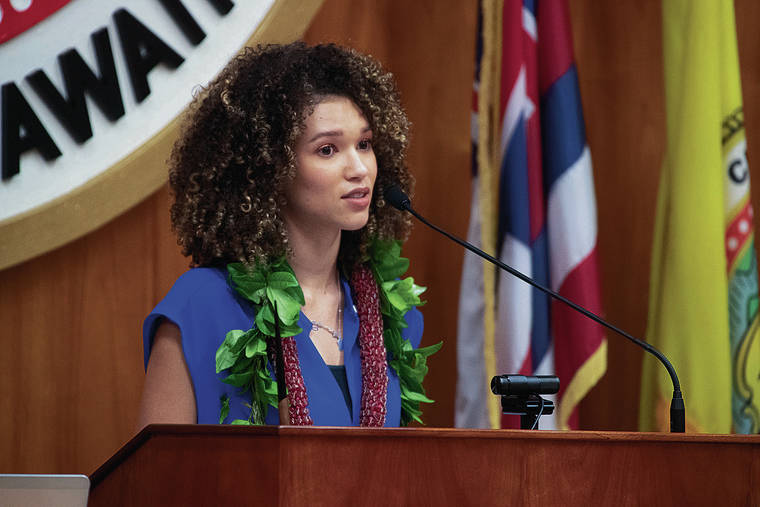Samantha Neyland, the first Black Miss Hawaii USA, spent 10 months advocating for Juneteenth to be officially recognized in Hawaii.
On Tuesday she received good news. Senate Bill 939, which will designate Juneteenth as an official state holiday, passed the full Senate and House. The bill is awaiting final approval from the governor’s office.
“Just passing it is great, but we have to educate people on what’s going in the Black community and why it’s important,” Neyland said. “There’s so many minority communities in Hawaii, which is a beautiful thing. This is for us to be seen and to be heard.”
If the bill becomes law, Hawaii will be the 49th state — leaving only South Dakota — to celebrate the
national observance of the end of slavery in the United States.
Juneteenth commemorates the day in 1865 — two years after the Emancipation Proclamation went into effect on Jan. 1, 1863 — when Union troops arrived in Galveston Bay to announce that over 250,000 enslaved Blacks in Texas were free.
Eleven years earlier the kingdom of Hawaii outlawed slavery, stating, “Slavery shall, under no circumstances whatsoever, be tolerated in the Hawaiian Islands; whenever a slave shall enter Hawaiian territory he shall be free, no person who imports a slave, or slaves, into the King’s dominions shall ever enjoy any civil or political rights.”
Last year’s police shootings of George Floyd, Ahmaud Arbery and Breonna Taylor prompted Neyland to create the
Hawai‘i for Juneteenth Coalition, composed of elected officials, civil rights activists and nonprofits.
“I was angry and confused. I was searching for information and answers,” Neyland said, referring to last year’s police shootings on the mainland. “I never set out to make a law. I had no experience, and I’m very humbled about admitting that. But I knew I wanted to make a difference.”
Neyland said the coalition was diligent on how
SB 939 and its companion House Bill 1308 progressed through the Legislature. However, when the House bill died in February, Neyland thought the Senate bill had a 20% chance of becoming law.
When SB 939 received
a hearing from the House Finance Committee, Neyland said, she noticed that the bill was amended to take effect on July 1, 2050.
“It’s so absurd,” Neyland said.
The coalition requested that Sen. Glenn Wakai (D, Kalihi-Salt Lake-Aliamanu), who introduced the Senate bill, amend the bill
to take effect upon the governor’s approval. It worked.
Despite the growing support of the measure, Neyland said she and her coalition faced pushback from “people who said that racism doesn’t exist in Hawaii.”
“Maybe we don’t have a big a racial problem as we do on the mainland, but that doesn’t mean our problems don’t exist and it doesn’t mean it’s OK,” Neyland said. “I mean, ‘not as bad’ is not an excuse to say, ‘Oh we’re fine.’ We can always be better and there’s always room for improvement.”
Black people make up 3% of the state population. But the Honolulu Star-Advertiser reported in 2018 that even though they are a relatively small percentage, they filed 30% of race-related employment discrimination complaints over the past decade. Two cases involved Black employees finding a noose on or by their work lockers.
Neyland said she’s hopeful the bill will become law and will continue to educate the community.
“It’s like running a marathon,” Neyland said. “It felt like the wind smacked me in the face and knocked me down. But I said, ‘We’re going to finish this marathon. I don’t care if I’m crawling on my hands and knees.’”

